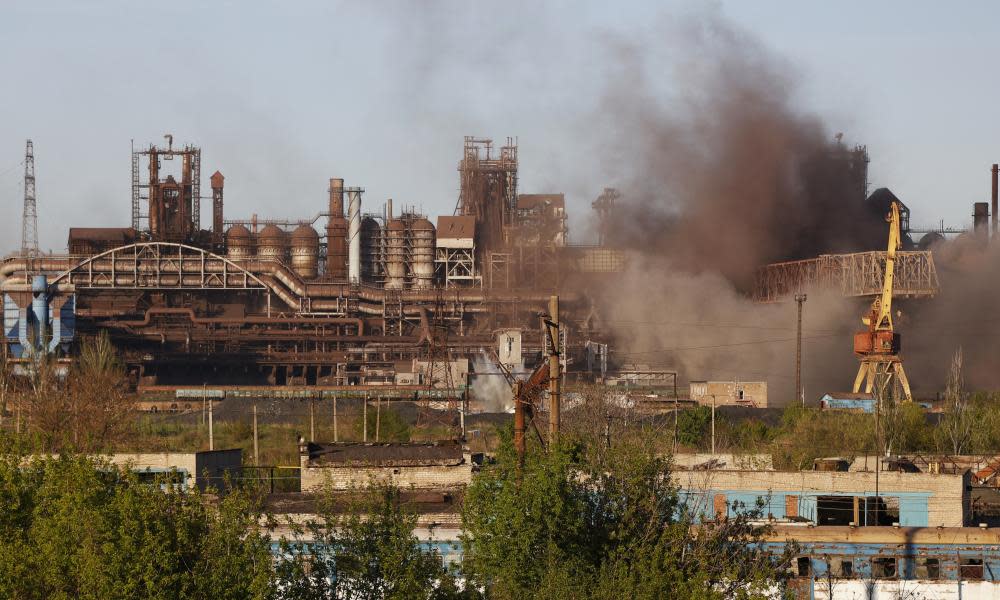Dozens dead in Ukraine prison blast as both sides trade blame

Dozens of Ukrainian prisoners of war have been killed in an attack on a prison building in Russian-occupied Donetsk that both sides in the war have blamed on each other.
Russia’s defence ministry said 40 prisoners were killed and 75 wounded in the attack on the prison in the frontline town of Olenivka. A spokesman for local, Russian-backed self-styled separatist forces put the death toll at 53. Both accused Ukrainian forces of striking the prison with US-made Himars rockets.
Ukraine said it believed about 40 people were killed and 130 were injured. Its defence forces denied responsibility and said Russian artillery had targeted the prison to hide the fact that the men held there had been “tortured and murdered”. The country’s foreign minister, Dmytro Kuleba, said Russia had committed a “barbaric war crime”.
Ukraine accused of Russia of attacking the prison as part of an “information war to accuse the Ukrainian armed forces of shelling civilian infrastructure and the population to cover up their own treacherous action”.
The county’s military intelligence said the strike was a “deliberate act of terrorism” and the domestic security agency the SBU said it had intercepted phone calls which point to Russia being responsible. Ukraine’s prosecutor-general, Andriy Kostin, said he had opened a war crimes investigation into the blast.
There was no way to immediately verify either of the two versions of events.
Footage broadcast on Russian television said to be from the scene at the prison showed military personnel examining a building with a hole in the roof, tangled metal from bunk beds and blood trails among personal effects. Other images showed charred bodies and dismembered limbs.
Russian media later published pictures of what it said were fragments from a US Himars rocket, gathered together and placed on what appeared to be a bench rather located in situ.
The SBU, said it had intercepted phone calls “in which the occupiers confirm that Russian troops are to blame for this tragedy”. The intercepted conversations indicate that the Russians may have placed explosives in the prison, the agency said in a statement. “In particular, none of the eyewitnesses heard any missile flying towards the correctional facility. There was no characteristic whistling, and the explosions occurred on their own.”
In addition, online video footage showed that the windows remained whole in some rooms of the facility, according to the SBU. That “indicates that the epicentre of the explosion was inside the destroyed building, and its walls took the hit from the blast waves, protecting some of the neighbouring rooms.”
The Ukrainian presidential adviser, Mykhailo Podolyak, called for a “strict investigation” into the attack and urged the United Nations and other international organisations to condemn it. He said the Russians had transferred some Ukrainian prisoners to the barrack that was hit just a few days before the strike, suggesting that it was planned. The Russian allegations, he said, were “a classic, cynical and elaborate false flag operation” designed to discredit Ukrainian authorities.
Olenivka is about 10km south of occupied Donetsk and close to the frontline. Establishing responsibility is likely to be highly challenging without independent access to the site.
According to reports, the Ukrainian troops who died were among those taken prisoner after the fierce fighting for the Azovstal steel mill complex in the port of city of Mariupol.
The Azov regiment and other Ukrainian units defended the steel mill for nearly three months, clinging to its underground maze of tunnels. They surrendered in May under relentless Russian attacks from the ground, sea and air.
Scores of Ukrainian soldiers were taken to prisons in Russian-controlled areas such as Donetsk, a breakaway area in eastern Ukraine run by Russian-backed separatist authorities.
Some have returned to Ukraine as part of prisoner exchanges with Russia, but families of others have no idea whether their loved ones are alive, or if they will ever come home.
Friday’s attack raises serious questions about where the prisoners were being held, in what circumstances, and why they had not been moved to a safer location.
It also raises questions about the status of those killed. Under the Geneva conventions, registered prisoners of war would not be tried for legally participating in conflict.
The claims of the death of the prisoners comes amid continuing fighting.
In the southern city of Mykolaiv, Russian shelling killed at least five people at a bus stop, with images from the city showing a number of bodies lying in the street. While the city has been repeatedly hit by Russian forces, buses are still running to Odesa and other nearby towns, often used by residents for evacuation.
Reuters contributed to this report

 Yahoo News
Yahoo News 